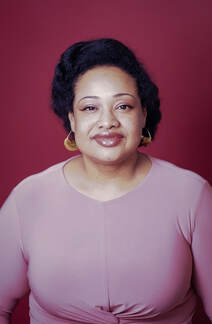granny speaks to the dead
Kabakaburi, Guyana January 2018
the wind is sulk
and salt, shaking
bamboo arched
into a green prayer for our path.
granny leads the way,
mummy beside her, walking
to the cluster of nameless
concrete graves
that compose the only family
history we know.
everything before 1913
is a fruitless game
of imagination made
for nights at home after rum
and black cake
granny and her sisters
arguing over who died
first and how:
aunt rosamund, baker
of the sweetest cakes
in adventure, lost
to her own love
of sugar — or uncle clive,
a dainty black man
with sooty skin
softer than the river
he walked into, beguiled
by the call of mermaids
or drink.
even granny’s history
is a twist
of ready evasion:
a young girl, eldest
of thirteen, who lived
hungry, breathless, and
beautiful, until my grandfather
found her on the waters
of demerara, took her
home and said
you are mine.
now, fifty years later,
granny is back home
beside me,
on hands and knees
cleaning a baby’s grave,
talking to her of death
saying my sweet girl,
ah’m here, keep me company
in my dreams, nuh?
I’ve learned from her how
to make your own story:
just let the dead in
the wind is sulk
and salt, shaking
bamboo arched
into a green prayer for our path.
granny leads the way,
mummy beside her, walking
to the cluster of nameless
concrete graves
that compose the only family
history we know.
everything before 1913
is a fruitless game
of imagination made
for nights at home after rum
and black cake
granny and her sisters
arguing over who died
first and how:
aunt rosamund, baker
of the sweetest cakes
in adventure, lost
to her own love
of sugar — or uncle clive,
a dainty black man
with sooty skin
softer than the river
he walked into, beguiled
by the call of mermaids
or drink.
even granny’s history
is a twist
of ready evasion:
a young girl, eldest
of thirteen, who lived
hungry, breathless, and
beautiful, until my grandfather
found her on the waters
of demerara, took her
home and said
you are mine.
now, fifty years later,
granny is back home
beside me,
on hands and knees
cleaning a baby’s grave,
talking to her of death
saying my sweet girl,
ah’m here, keep me company
in my dreams, nuh?
I’ve learned from her how
to make your own story:
just let the dead in
M. Saida Agostini is a queer Afro-Guyanese poet whose work explores the ways that Black folks harness mythology to enter the fantastic. Agostini's poetry can be found in Barrelhouse Magazine, the Black Ladies Brunch Collective's anthology, Not Without Our Laughter, and other publications. Her first collection of poems, just let the dead in, was a finalist for the Center of African American Poetry & Poetics’ 2020 Book Prize, as well as the New Issues Poetry Prize. She is currently at work on a chapbook exploring the history of Nellie Jackson, a Black woman entrepreneur who operated a brothel for sixty years in Natchez, Mississippi. A Cave Canem Graduate Fellow, Agostini has been awarded honors and support for her work by the Watering Hole and Blue Mountain Center, as well as a 2018 Rubys Grant funding travel to Guyana to support the completion of her first manuscript.
Art: Architect of the Masochist by Cierra Rowe
Powered by Women

